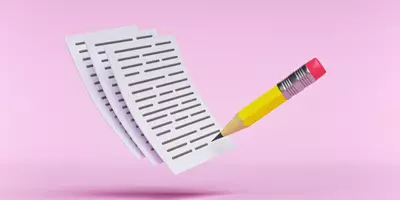
May 3, 2021 ● Kate Lopaze
How to upgrade an outdated resume
Maybe it’s been a while since you’ve been in the job market. Maybe you’ve been sending out the same resume for years, relying on Old Faithful when a new job opens up. Either way now is a great time to revamp your resume and make sure it’s clean and modern. The average time spent reading a resume is seconds, not minutes, so you’ve got to grab hiring managers fast and make a good impression. Let’s walk through some tips for sprucing up your resume so that you’re attracting the right kind of attention.
Let go of unnecessary text
Real estate is crucial in your resume—you want to make sure you’re using every bit of space for useful, compelling information. That means letting go of some more traditional (but less practical) parts of the resume.
An objective section is usually a one-sentence blurb announcing what you want out of your job search. Psst . . . anyone reading your resume already knows what you want: this job. This is space that could be better used with a brief headline of your most relevant skills and experience instead of a vague sentence about how you’re seeking a position.
Another holdover from the old days of resume-ology is the line “references available upon request” or a laundry list of potential references. These days, it’s a foregone conclusion that you’ll need to provide references at some point before you’re hired. That’s something you’ll be asked by the company if you make it to the next stage (or get an offer), so there’s no need to use up resume space up front telling the reader that you do, in fact, have references.
Now that resumes are mostly digital, the “one-page” rule of thumb may seem outdated, but it’s still a good guideline to help you keep things concise and organized. If you have absolutely relevant information that goes beyond a page, great—but be conscious of the fact that you want your best information to be clear to even the fastest readers.
Update your skills
One of the biggest mistakes people make on resumes is including a laundry list of all the skills, leading to the most important ones getting lost. Ideally, your resume is targeted toward a specific job opening, which means your listed skills should be the ones most relevant to that specific gig.
Even if your resume isn’t super-targeted you should still only be including the most applicable skills and within a certain window. You don’t need to include old skills or certifications if they’re not directly relevant to the job you’re seeking now.
Get rid of old jobs that aren’t relevant
A resume is just a snapshot of your best qualifications for the job; it’s not necessarily a forensic history of your working life. If you’re not a recent grad and yet your resume goes all the way back to school days, it’s time to do some thoughtful editing. Again, space is important—do you really need to go into the details of a job you had ten years ago?
If you want to make sure you show continuity in your work history, you can condense older jobs under a brief heading and a set of years instead of fleshing them out with detailed bullets. And if you had old jobs that aren’t really applicable, those should be taken out entirely. For example, the life and work skills you gained waiting tables that summer may be significant to you, but they aren’t likely to help you get a job in healthcare administration now.
It’s important to look at your work history with a critical eye—what is most essential and relevant to the job you want now? Those are the bullet points where you want to focus your care and energy.
Think about your format
The reality of the 2021 job search is that you’re not printing your resume on nice paper and mailing it to be opened and read by hand. You’re emailing it or submitting it to a digital engine to be skimmed by keyword bots or a busy professional. Your focus should be on making the text clear and readable. Bullet points should be concise and to the point. Descriptions should be about a sentence or two. Break up long chunks of text, because those can be hard to read on a screen.
By taking a critical look at your resume—or, ideally, rebuilding from the ground up—you’ll help make sure that your resume is a sleek, modern advertisement for your greatness as a candidate.


